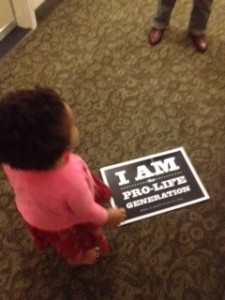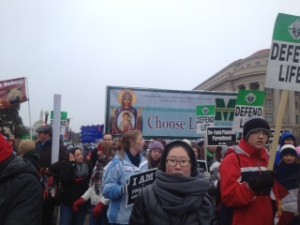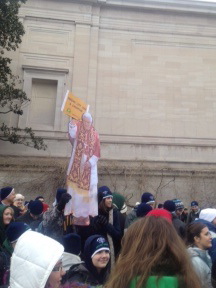 I had never participated in the annual March for Life before January 25, and I have to admit, I’d been a bit nervous about attending for the first time. Don’t get me wrong, the Catholic Church’s consistent prolife ethic, “from conception to natural death,” is one of her teachings which I find at once fully coherent, tremendously countercultural, undeniably Scriptural and personally challenging. And I have seen many examples of the commitment of so many Catholics to a vision of human life as a “seamless garment,” a phrase from John 19:23 taken up by pacifist Eileen Egan to describe a holistic reverence for life’s sacredness and the consistent application of an ethic of life on issues such as abortion, capital punishment, militarism, euthanasia, and social and economic injustice.
I had never participated in the annual March for Life before January 25, and I have to admit, I’d been a bit nervous about attending for the first time. Don’t get me wrong, the Catholic Church’s consistent prolife ethic, “from conception to natural death,” is one of her teachings which I find at once fully coherent, tremendously countercultural, undeniably Scriptural and personally challenging. And I have seen many examples of the commitment of so many Catholics to a vision of human life as a “seamless garment,” a phrase from John 19:23 taken up by pacifist Eileen Egan to describe a holistic reverence for life’s sacredness and the consistent application of an ethic of life on issues such as abortion, capital punishment, militarism, euthanasia, and social and economic injustice.
A few examples of seeing the “seamless garment” ethic at work jump to mind. I recently attended a fundraiser for Lighthouse Women’s Center, a state-of-the-art, licensed medical center in Denver working in cooperation with Catholic Charities to offer
 free ultrasound imaging, pregnancy tests, and counseling services to women facing unexpected pregnancies. I appreciate that their mission also includes creating a warm and confidential space and that their counseling resources are also available to “boyfriends, spouses, family and friends who are navigating these important decisions alongside the women in their lives.” I worked alongside lay and religious volunteers at Denver’s Catholic Worker Thrift Store, whose pro-life work was to offer homeless customers a dignified place to procure affordable and clean clothing, while selling higher-priced antique items to a wealthier clientele to support this effort, as well as Denver’s Catholic Worker house and partner soup kitchen. I have also been inspired by many pro-life Catholics working to reverse the systemic injustices that aggravate many of these same issues, such as my friends Mike and Mary, who do advocacy work
free ultrasound imaging, pregnancy tests, and counseling services to women facing unexpected pregnancies. I appreciate that their mission also includes creating a warm and confidential space and that their counseling resources are also available to “boyfriends, spouses, family and friends who are navigating these important decisions alongside the women in their lives.” I worked alongside lay and religious volunteers at Denver’s Catholic Worker Thrift Store, whose pro-life work was to offer homeless customers a dignified place to procure affordable and clean clothing, while selling higher-priced antique items to a wealthier clientele to support this effort, as well as Denver’s Catholic Worker house and partner soup kitchen. I have also been inspired by many pro-life Catholics working to reverse the systemic injustices that aggravate many of these same issues, such as my friends Mike and Mary, who do advocacy work
 to address some contributing factors related to homelessness, especially among veterans and those suffering from mental illness. And finally, during my time in rural South Africa and Zimbabwe, I witnessed the commitment of faith-filled Catholic lay people, religious, and clergy to running efficient NGOs and schools for the protection and support of life. And all this in communities where some of the world’s most vulnerable lives stand in the balance, such as those closely affected by the HIV/AIDS epidemic and living in tremendous poverty and especially those little persons referred to in development programs as “OVC’s” (Orphans and Vulnerable Children).
to address some contributing factors related to homelessness, especially among veterans and those suffering from mental illness. And finally, during my time in rural South Africa and Zimbabwe, I witnessed the commitment of faith-filled Catholic lay people, religious, and clergy to running efficient NGOs and schools for the protection and support of life. And all this in communities where some of the world’s most vulnerable lives stand in the balance, such as those closely affected by the HIV/AIDS epidemic and living in tremendous poverty and especially those little persons referred to in development programs as “OVC’s” (Orphans and Vulnerable Children). to a Habitat for Humanity project in Pennsylvania. Somehow managing to find my younger sister and her high school contingent along the route to the Supreme Court Building, I met one of her teachers, a graduate in Notre Dame’s Alliance for Catholic Education (ACE) program, a service-through-teaching program seeking to sustain and strengthen inner-city and under-resourced Catholic schools. I saw my friend Shane, an ND undergrad, chanting with a big group as he marched, “Hey, hey, ho, ho, Roe v. Wade has got to go!” Just two days before, I’d seen him speaking with a representative from Big Brothers, Big Sisters at a volunteer service fair about becoming a Big Brother. I’ve also admired his commitment to riding his bike and taking mass transportation whenever possible out of environmental concern.
to a Habitat for Humanity project in Pennsylvania. Somehow managing to find my younger sister and her high school contingent along the route to the Supreme Court Building, I met one of her teachers, a graduate in Notre Dame’s Alliance for Catholic Education (ACE) program, a service-through-teaching program seeking to sustain and strengthen inner-city and under-resourced Catholic schools. I saw my friend Shane, an ND undergrad, chanting with a big group as he marched, “Hey, hey, ho, ho, Roe v. Wade has got to go!” Just two days before, I’d seen him speaking with a representative from Big Brothers, Big Sisters at a volunteer service fair about becoming a Big Brother. I’ve also admired his commitment to riding his bike and taking mass transportation whenever possible out of environmental concern.
“A consistent ethic does not say everyone in the Church must do all things, but it does say that as individuals and groups pursue one issue, whether it is opposing abortion or capital punishment, the way we oppose one threat should be related to support for a systemic vision of life. It is not necessary or possible for every person to engage in each issue, but it is both possible and necessary for the Church
 as a whole to cultivate a conscious explicit connection among the several issues. And it is very necessary for preserving a systemic vision that individuals and groups who seek to witness to life at one point of the spectrum of life not be seen as insensitive to or even opposed to other moral claims on the overall spectrum of life. Consistency does rule out contradictory moral positions about the unique value of human life. No one is called to do everything, but each of us can do something. And we can strive not to stand against each other when the protection and the promotion of life are at stake.”
as a whole to cultivate a conscious explicit connection among the several issues. And it is very necessary for preserving a systemic vision that individuals and groups who seek to witness to life at one point of the spectrum of life not be seen as insensitive to or even opposed to other moral claims on the overall spectrum of life. Consistency does rule out contradictory moral positions about the unique value of human life. No one is called to do everything, but each of us can do something. And we can strive not to stand against each other when the protection and the promotion of life are at stake.”